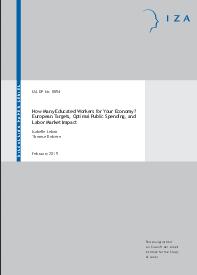Barrios, S., Fatica, S., Martinez, D. & Mourre, G. (2015) “The fiscal effects of work-related tax expenditures in Europe“, European Economy. Economic Papers, Νο. 545. February: Brussels. Work-related tax incentives can have a significant effect on how much, if at all, certain individuals decide to work. This paper examines the fiscal impacts and associated welfare costs of reforms to such tax relief measures in five European countries, France, Spain, …Read More
Searching for the EMU core member countries
Basse, T. (2015) “Searching for the EMU core member countries“, European Journal of Political Economy, Vol. 34, Supplement, Ιούνιος 2014, pp. S32–S39. This study uses techniques of cointegration analysis and tests for structural change to search for changes to sovereign credit risk in some relevant member states of the European Monetary Union (EMU) trying to identify core countries. While there are a number of core countries the empirical findings …Read More
Five minutes with Philippe Legrain: “The Eurozone has become a glorified debtors’ prison”
Interview: “Five minutes with Philippe Legrain: “The Eurozone has become a glorified debtors’ prison”, LSE EUROPP, 09 Μαρτίου 2015. With no lasting solution yet found for dealing with Greek debt, and economies in the Eurozone continuing to suffer from weak growth, how can Europe finally solve the problems brought on by the financial crisis? In an interview with EUROPP’s editor Stuart Brown, Philippe Legrain discusses the policy failures at …Read More
European Democracy Is In A State Of Emergency
Offe, C. (2015) “European Democracy Is In A State Of Emergency“, Social Europe Journal, 06 Μαρτίου. Europe has had a rocky start to 2015. The Eurozone crisis is back on the agenda, a war is developing at Europe’s border and people across the continent seem more and more discontent with their political systems leading to the rise of different forms of populism. How healthy do you think is European …Read More
Cyprus and Iceland: a tale of two capital controls
Davíðsdóttir, S. (2015) “Cyprus and Iceland: a tale of two capital controls“, A Fistful of Euros – European Opinion Blog, 06 Μαρτίου. Both in Cyprus and Iceland foreign funds flowed into the islands, in the end forcing the government to make use of extreme measures when the tide turned. These measures are normally called ‘capital controls’ which in these two cases hides the fact that the measures used are …Read More
Austerity and recovery: East Asian lessons for Europe
Chari, Α. & Blair Henry, Ρ. (2015) “Austerity and recovery: East Asian lessons for Europe“, VoxEU Organisation, 06 Μαρτίου. In the wake of the Great Recession, a contentious debate has erupted over whether austerity is helpful or harmful for economic growth. This column compares the experiences of the East Asian countries – whose leaders responded to the East Asian financial crisis with expansionary fiscal policy – with those of …Read More
Macroprudential spillovers: The role of organisational structure
Danisewicz, Ρ., Reinhardt, D. & Sowerbutts, R. (2015) “Macroprudential spillovers: The role of organisational structure“, VoxEU Organisation, 05 Μαρτίου. In a global financial system, macroprudential policies may create international spillovers. This column presents new evidence on how the organisational structure of a bank affects the magnitude of these spillovers. An increase in capital requirements at home causes foreign branches to reduce their lending growth to other banks operating in …Read More
The EU risks alienating the Moldovan population if it fails to take a tougher line with the country’s pro-European parties
Cenusa, D. (2015) “The EU risks alienating the Moldovan population if it fails to take a tougher line with the country’s pro-European parties“, LSE EUROPP, 05 Μαρτίου. The EU signed an association agreement with Moldova in 2014. Denis Cenusa writes on the EU’s relations with the country since 2009, when a pro-European alliance of parties first came to power. He argues that the failure of these parties to successfully …Read More
How Many Educated Workers for Your Economy? European Targets, Optimal Public Spending, and Labor Market Impact
Lebon, Ι. & Rebière, Τ. (2015) “How Many Educated Workers for Your Economy? European Targets, Optimal Public Spending, and Labor Market Impact“, IZA DP No. 8854, Φεβρουάριος. This paper studies optimal taxation schemes for education in a search-matching model where the labor market is divided between a high-skill and a low-skill sector. Two public policy targets –maximizing the global employment level and optimizing the social surplus– are studied according …Read More
What does it really mean to be ‘pro-business’?
Ha-Joon Chang (2015) “What does it really mean to be ‘pro-business’?“, The Guardian, 03 Μαρτίου. Despite the best efforts of some of its members to discredit it with market rigging, tax avoidance, and unjustified bonuses, the business community is still held in awe in Britain. Any suggestion of higher taxes for top earners or tougher regulations on the abuse of market power is howled down as dangerously anti-business. Politicians …Read More





